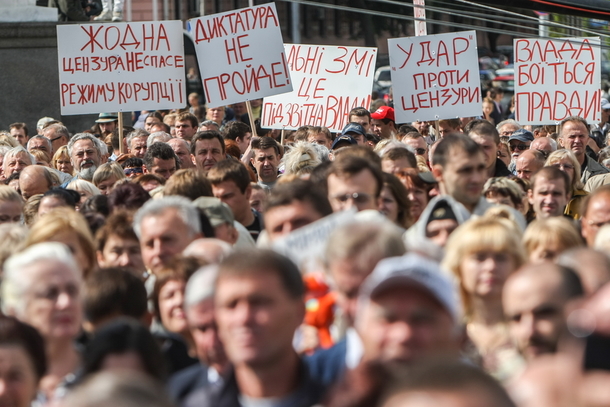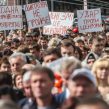
Black Banners and White Front Pages Against Libel Laws in Ukraine
Publication: Eurasia Daily Monitor Volume: 9 Issue: 178
By:

An intention by the ruling Party of Regions (PRU) to toughen up libel laws has triggered protests from local journalists. Many suspect that the proposed amendments could be used to stifle dissent ahead of the October 28 parliamentary election and the presidential election scheduled for 2015. Sensing scandal and afraid of negative reaction by the West, the ruling elite started to play “good cop.” President Viktor Yanukovych was quick to say the bill was a mistake; there are also indications that the parliament may not approve the bill on second reading. However, PRU representatives made it clear that their party would try to tighten up libel legislation again in the future (Ukrainska Pravda, September 26).
On September 18, the 450-seat Ukrainian parliament passed by 244 votes in favor the first reading of a bill to amend the criminal and criminal procedure codes. Provisions in the bill stipulate that journalists, policemen and judges could face from two to five years imprisonment for libel (Interfax-Ukraine, September 18). The bill comes eleven years after Ukraine abandoned its Soviet laws that sanctioned prison terms for libel. The author of the law is PRU’s Member of Parliament Vitaly Zhuravsky, who has served as staff adviser to Yanukovych for the past several years (obozrevatel.com, April 19; file.liga.net, May 25).
Initial reactions showed that the government camp was divided on the amendments. First Deputy Prime Minister Valery Khoroshkovsky, whose family owns one of Ukraine’s most popular TV channels, Inter, opined that it was not expedient to toughen up libel laws (Ukrainska Pravda, September 19). Yanukovych’s media adviser Hanna Herman, who used to work for RFE/RL, said on a talk show that the president definitely would not sign the amendments into law (UT1, September 21).
The local media reaction to Zhuravsky’s bill was predictably indignant. At the end of September, several leading opposition web sites and news agencies displayed black banners with links to contact information of parliamentarians, who voted in favor of the amendments, calling on readers to ask them directly why they did so. Several daily and weekly newspapers ran blank front pages on September 27 and 28 in protest against the bill.
The European Commission suggested that Kyiv should not hurry with the adoption of the controversial bill, saying that it contradicted Ukraine’s obligations to the Council of Europe, the European human rights watchdog (Interfax-Ukraine, September 20). Addressing a recent international forum in Yalta, US Deputy Assistant Secretary of State Thomas Melia criticized restrictions on access to the media in Ukraine (Interfax-Ukraine, September 15). US Assistant Secretary of State Philip Gordon expressed concern over reports about harassment of independent and opposition media by local authorities, tax inspectors and prosecutors (Ukrainska Pravda, September 21).
Finally Yanukovych, forced to express his opinion on the bill during his visit to New York, said that it was Zhuravsky’s personal mistake (Interfax-Ukraine, September 26). On the same day, Zhuravsky indicated he wanted to recall his bill. But judging by the wording of his statement, Zhuravsky does not seem to think he committed a mistake. He suggested that society “feared and distrusted” his “initiative” only because it coincided with the election campaign. Further, Zhuravsky declared he would not change his opinion that it was high time for Ukraine to toughen up libel laws (Ukrainska Pravda, September 25). There are indications that the parliament might pass Zhuravsky’s or a similar bill after the parliamentary elections, if the PRU continues to dominate the legislature. PRU senior MP Serhy Kivalov has already stated that parliament would return to the issue (Ukrainska Pravda, September 26). Several hundred opposition activists and journalists afraid of this prospect picketed parliament on October 1 and called for a strike (Ukrainska Pravda, October 1).
The Ukrainian authorities are accustomed to playing “good cop, bad cop” on matters concerning media freedom. In the summer, local prosecutors closed proceedings against Mykola Knyazhytsky, director of the opposition channel TVi, who had been suspected of tax evasion. They also dropped the case against the website lb.ua for revealing the content of private text messages of a member of parliament from the ruling party. The prosecutors said the cases against both media outlets were closed after interference from Yanukovych, who ordered the Prosecutor-General’s Office to oversee the cases (UNIAN, July 27; lb.ua, August 3). It is obviously very important for Yanukovych to convince the West that media freedom is not under threat ahead of the October 28 elections, especially since the imprisonment in 2011 of several opposition politicians, including former Prime Minister Yulia Tymoshenko, made him almost an international pariah.
However, the temptation to muzzle the opposition media is apparently very strong. TVi in particular continues to experience problems. This past summer, TVi was excluded from the Triolan cable networks in several Ukrainian cities while another nationwide cable operator, Volya, moved TVi to a more expensive package in an apparent attempt to limit its audience. Interestingly, Triolan suggested that TVi itself or the opposition could have organized a technical sabotage of TVi’s broadcasts for political purposes (Interfax-Ukraine, September 5). On September 12, a court in Kyiv charged TVi with tax evasion and the government temporarily froze its bank accounts (UNIAN, Kommersant-Ukraine, September 13). Yanukovych intervened again, expressing his concern with “the attempts to hinder broadcasts and commercial activities of the TV channel” (president.gov.ua, September 17).




